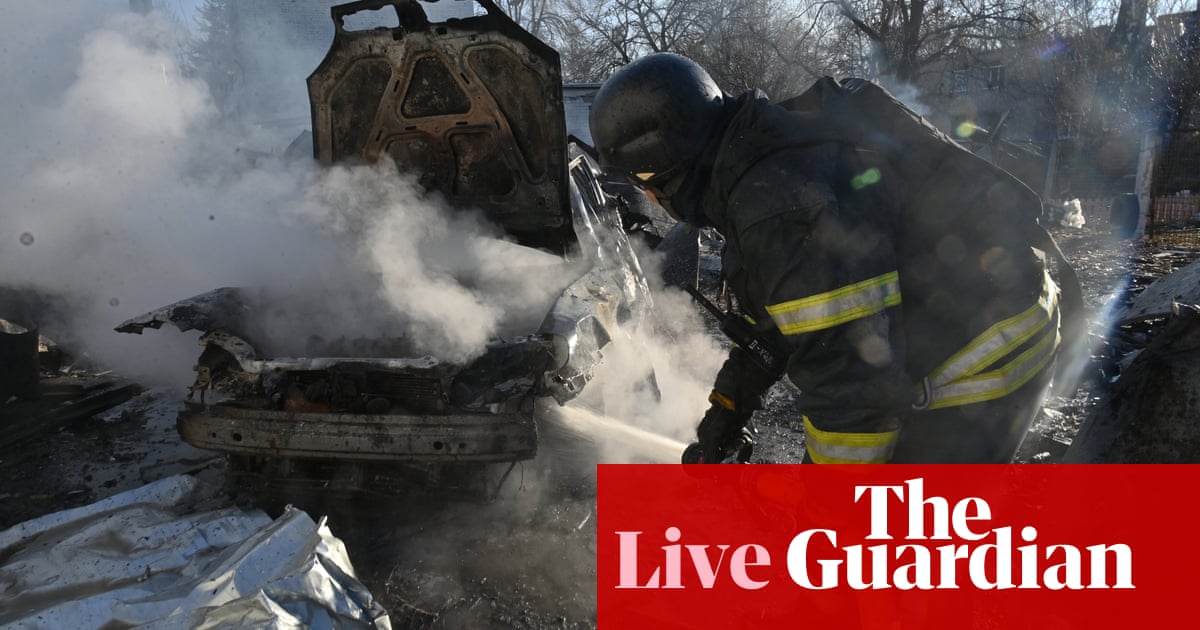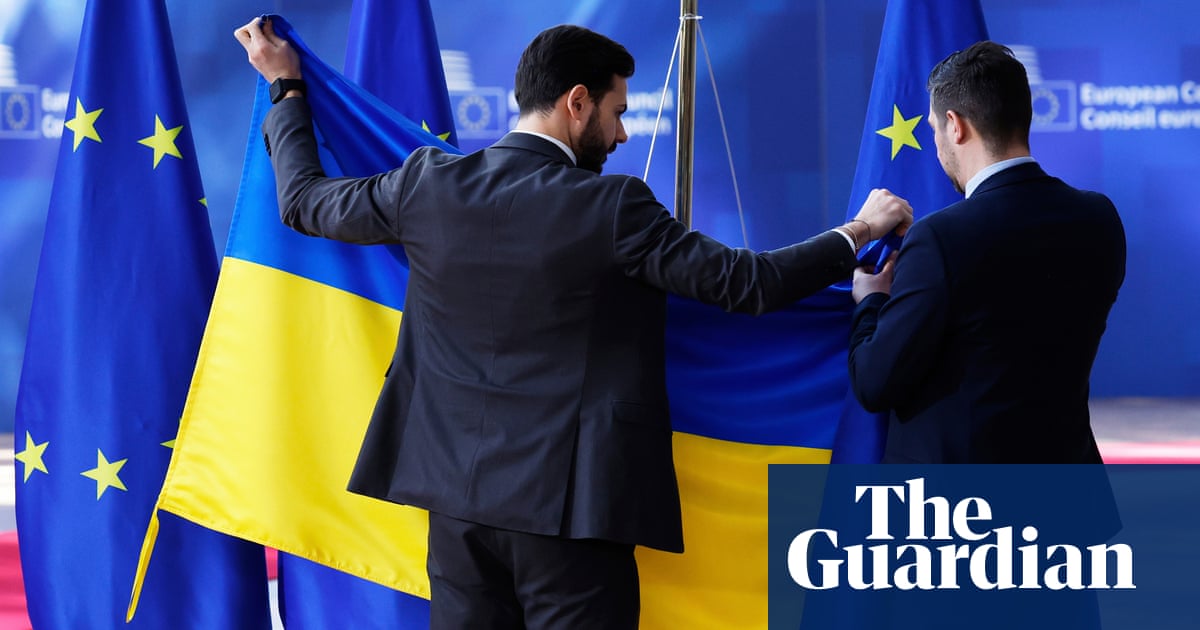Tracking down Scorpion, Europe’s most wanted migrant-smuggler
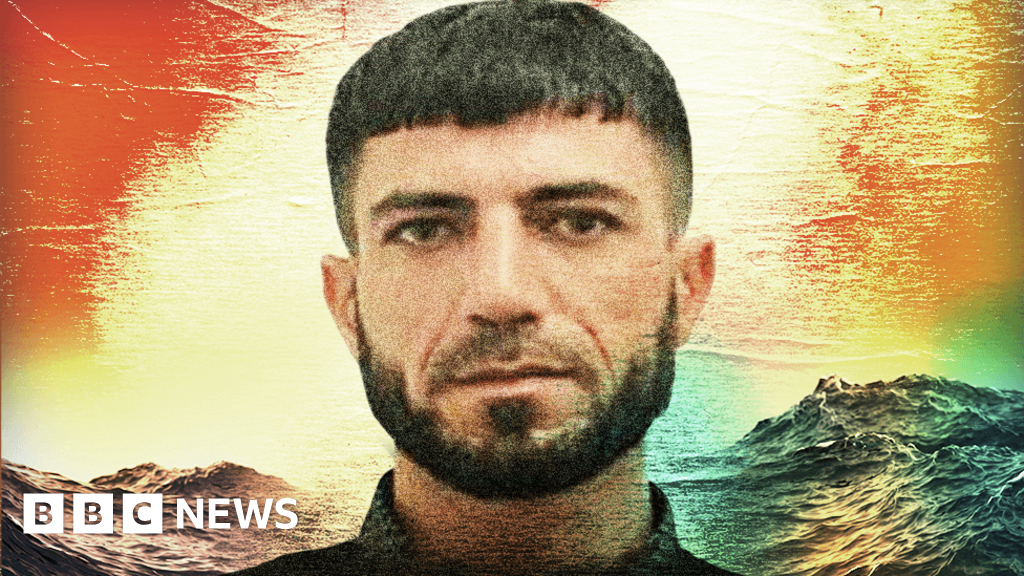
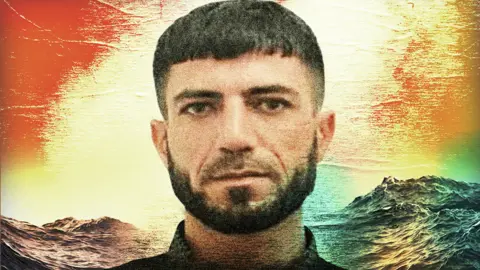 BBC
BBCI am sitting in a shopping mall in Iraq, face-to-face with one of Europe’s most notorious people-smugglers.
His name is Barzan Majeed, and he is wanted by police forces in several countries, including the UK.
Over the course of our conversation – both here and the next day at his office – he says he does not know how many migrants he has transported across the English Channel.
“Maybe a thousand, maybe 10,000. I don’t know, I didn’t count.”
The meeting is the culmination of what had seemed like an impossible task a few months earlier.
Together with Rob Lawrie, a former soldier who works with refugees, I had set out to find and question the man known as Scorpion.
For several years, he and his gang controlled much of the people-smuggling trade – in boats and lorries – across the English Channel.
More than 70 migrants have died making the crossing by boat since 2018 – last month, five people were killed off the French coast, including a seven-year-old girl.
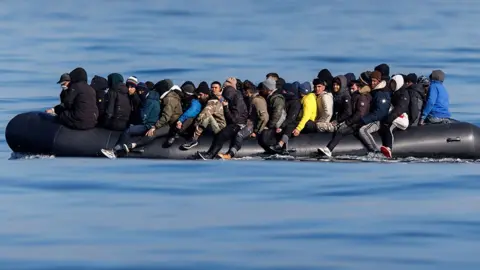 EPA
EPAIt is a dangerous journey, but for the smugglers it can be very lucrative.
They can charge £6,000 per person for a boat crossing – and with nearly 30,000 people attempting it in 2023, the potential for profit is obvious.
Our interest in Scorpion had begun with a little girl we met in one of the migrant camps near Calais, in northern France.
She had almost died trying to cross the English Channel in an inflatable dinghy.
The dinghy was not seaworthy – it was cheap, bought second-hand in Belgium – and the 19 people on board had no lifejackets.
Who would send people out to sea like this?
When police in the UK pick up illegal migrants, they take and inspect their mobile phones.
From 2016 onwards, the same number kept cropping up.


Often it would be stored under the name “Scorpion”. Sometimes it would be stored as a picture of a scorpion.
Martin Clarke, a senior investigating officer at the UK’s National Crime Agency (NCA) told us that officers started to realise “Scorpion” referred to a Kurdish Iraqi man called Barzan Majeed.
As a 20-year-old in 2006, Majeed had himself been smuggled into England in the back of a lorry. Despite being refused leave to remain a year later, he stayed several more years in the UK – some of it in prison for gun and drug offences.
He was finally deported to Iraq in 2015. Shortly after this, it is believed that Majeed “inherited” a people-smuggling business from his elder brother, who was serving a jail sentence in Belgium.
Majeed became known as Scorpion.
Between 2016 and 2021, Scorpion’s gang is believed to have controlled much of the people-smuggling trade between Europe and the UK.
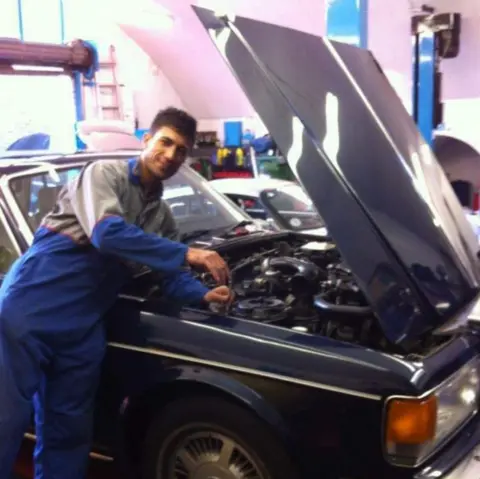 Facebook
FacebookA two-year international police operation resulted in convictions for 26 members of the gang at courts in the UK, France and Belgium.
But Scorpion himself evaded arrest and went on the run.
In his absence, he was tried in a Belgian court and convicted of 121 counts of people-smuggling. In October 2022, he was sentenced to 10 years in jail and fined €968,000 (£834,000).
Since then, Scorpion’s whereabouts were unknown. This was the mystery we wanted to crack.
A contact of Rob introduced us to an Iranian man who said he dealt with Scorpion when he had been trying to get across the Channel. Scorpion had told the Iranian he was based in Turkey, from where he was co-ordinating his business remotely.
In Belgium, we tracked down Majeed’s elder brother – now out of jail. He also said Scorpion was likely to be in Turkey.
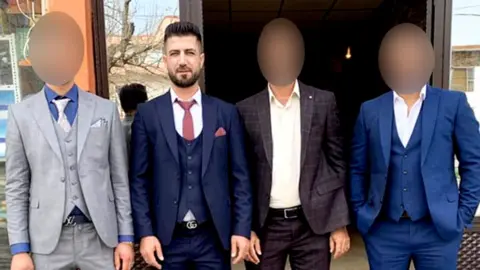
For most migrants heading to the UK, Turkey is an important staging post. Because of its immigration laws, it is relatively easy to get a visa to enter the country from Africa, Asia and the Middle East.
A tip-off led us to a cafe in Istanbul frequented by people-smugglers. Barzan Majeed had recently been seen there.
Our initial enquiries did not go well. We asked the manager if he could tell us about the trade – the cafe went quiet.
Soon after, a man passed our table and unzipped his jacket to show us he was carrying a gun. It was a reminder that we were dealing with dangerous people.
Our next stop yielded more promising results. We were told that Majeed had recently deposited €200,000 (£172,000) at a money exchange a few streets away. We left our number there, and in the middle of the following night, Rob’s phone rang.
The caller ID said “Number withheld” – on the end of the line was someone claiming to be Barzan Majeed.
It was so late, and so unexpected, there was no time to record the beginning of the call. Rob recalled the voice on the line: “He goes, ‘I hear you’re looking for me.’ And I go, ‘Who are you? Scorpion?’ He goes, ‘Ha, you want to call me that? That’s fine.’”
There was no way of telling whether this was the real Barzan Majeed, but the details he gave tallied with what we knew. He said he had been living in Nottingham until 2015 when he was deported. But he denied being involved in the trafficking business.
“This is not true!” he protested. “It’s just the media.”
The line kept cutting out, and despite our gentle probing, he gave no clue as to his location.
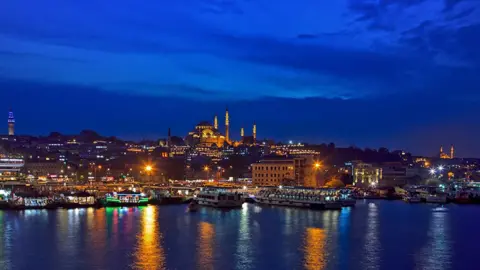 Getty Images
Getty ImagesWe had no idea when, or if, he would call again. Meanwhile, a local contact of Rob told us that Scorpion was now involved in smuggling migrants from Turkey to Greece and Italy.
What we heard was disturbing. Up to 100 men, women and children were being crowded on to yachts that were licensed to carry about 12 people.
The yachts would often be piloted by smugglers with no experience of sailing, and would take a dangerous route between clusters of small islands to avoid coastguard patrols.
There was big money to be made. Passengers were said to be paying about €10,000 each for a place on one of these boats. Over the past 10 years, more than 720,000 people are thought to have attempted to cross the eastern Mediterranean into Europe – of those, nearly 2,500 died, most by drowning.
Julia Schafermeyer, from the charity SOS Mediterranean, says the traffickers put people’s lives in great danger: “I don’t think it makes any difference to them whether these people live or die.”
About this time, we had the chance to put this question to Scorpion directly. Out of the blue, he called us again.
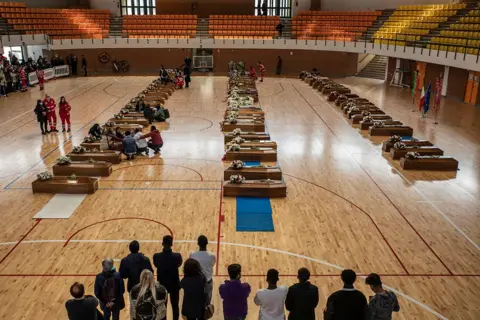 Getty Images
Getty ImagesOnce again, he denied being a smuggler. However, his definition of the word seemed to be someone who physically carried out the task, rather than someone pulling the strings.
“You have to be there,” he told us, adding: “Even now, I’m not there.”
He was just the “money man”, he said.
Majeed also seemed to show little sympathy for drowned migrants.
“God [writes it down] when you’re going to pass away, but this is sometimes your fault,” he said. “God doesn’t never say ‘Go inside the boat’.”
Our next stop was the resort of Marmaris, where Turkish police said they believed Scorpion owned a villa. We asked around and received a call from someone who said they had been friendly with him.
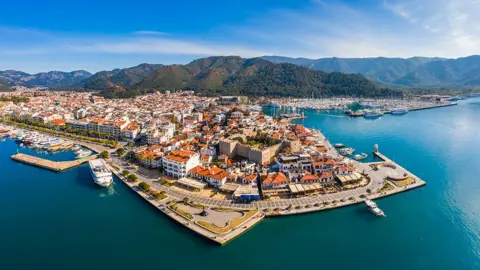 Getty Images
Getty ImagesShe knew Majeed was involved in people-smuggling, and said that although this caused him stress, his worry was about the money, not the fate of the migrants.
“He didn’t care about them – that’s really sad, isn’t it?” she said. “It’s something I think back on and feel some shame because I… heard things and I knew they weren’t good.”
She added that she had not seen him at his villa in Marmaris recently, although someone had told her he could be in Iraq.
This was borne out by another contact, who said they had actually seen Scorpion at a money exchange in Sulaymaniyah, a city in the Kurdistan region of Iraq.
We set off. If we could not find Scorpion there, we decided we would have to give up.
But Rob’s contact managed to get in touch with him. At first, he was very suspicious, worried we somehow planned to snatch him and take him back to Europe.
A flurry of text messages followed, first through Rob’s contact and then with Rob himself. Scorpion said he might meet us, but only if he was allowed to choose the venue. We ruled that out, worried he might be setting us up.
And then a text message arrived, asking simply: “Where are you?”
We said we were on our way to a nearby mall. Scorpion told us to meet him there in a coffee shop on the ground floor.
Finally, we saw him.
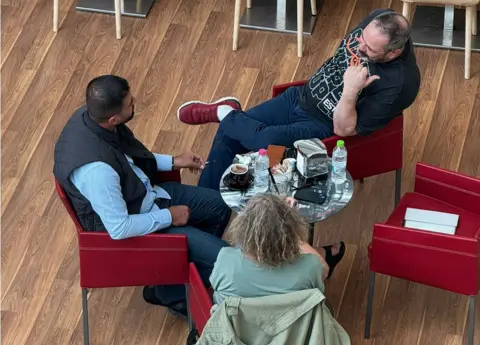
Barzan Majeed looked like an affluent golfer. He was smartly dressed, in new jeans, a light-blue shirt and a black gilet.
When he put his hands on the table, I saw his fingernails were manicured.
Meanwhile, three men took a seat at a nearby table. His security team, we guessed.
Once more, he denied being a big player at the top of a criminal organisation. He said other gang members had tried to implicate him.
“A couple of people, when they get arrested, they say, ‘We’re working for him’. They want to get less sentence.”
He also seemed bitter that other smugglers had been given British passports and carried on their trade.
“In three days, one guy sent 170 or 180 people from Turkey to Italy, still holding a British passport!” he says. “I want to go to some other country to do business. I can’t.”
When we pressed him about his responsibility for migrant deaths, he repeated what he had said on the phone – that he just took the money and booked places.
For him, a smuggler was someone who loaded the people onto boats and lorries and transported them: “I never put anybody in a boat and I never kill anybody.”
The conversation ended, but Scorpion invited Rob to see the money exchange he worked from in Sulaymaniyah.
It was a small office – there was some writing in Arabic on the window and a couple of mobile phone numbers. People came here to pay for passage. Rob said that while he was there he saw a man carrying a box full of cash.
On this occasion, Scorpion talked about how he got into the business in 2016, when many thousands of people were heading into Europe.
“Nobody forced them. They wanted to,” he said. “They were begging the smugglers, ‘Please, please do this for us.’ Sometimes the smugglers say, ‘Just because of the sake of God, I will help them’. And then they complain, they say, ‘Oh this, that…’ No, this is not true.”
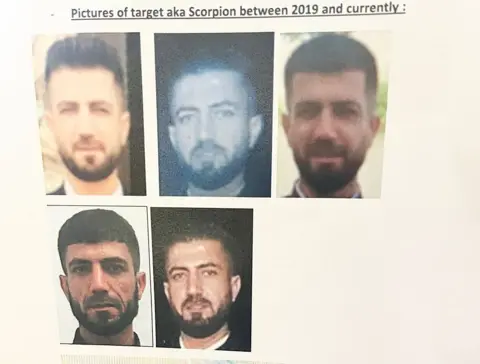
Between 2016 and 2019, Scorpion said he had been one of two main people heading operations in Belgium and France, and admitted he had handled millions of dollars at that time.
“I done them kind of things. Money, location, passengers, smugglers… I was between all of them.”
He denied that he was still involved in people-smuggling, but his actions seemed to contradict this.
Scorpion did not realise it, but as he scrolled through his mobile phone, Rob caught a reflection of the screen in a polished picture frame on the wall behind.
What Rob could see was lists of passport numbers. We later learned that smugglers would send these to Iraqi officials. They would then be bribed to issue false visas so migrants could travel to Turkey.
That was the last we saw of Scorpion.
At every stage, we shared our discoveries with the authorities in the UK and Europe.
Ann Lukowiak, a public prosecutor in Belgium who was involved in convicting Scorpion, still hopes that one day he will be extradited from Iraq.
“It’s important to us to have sent the signal that you can’t do what you want,” she says. “We will eventually take him down.”
Additional reporting by Ben Milne
Related
Zelenskyy reiterates call for air truce after huge Russian attack…
We need Russia to stop attacks, Zelenskyy says, backing calls for truce in air, at seaUkrainian president Volodymyr Zelenskyy has responded to overnight attacks
Europe scrambles to rearm as Trump threatens security guarantees and…
CNN — European leaders have vowed to rearm the continent at historic emergency talks h
Russia launches ‘massive’ attack on Ukraine after Europe rushes to…
Ukraine's energy and gas infrastructure came "under massive missile and drone shelling" by Russia on Friday, a Ukrainian minister said."The energy and gas infra
American severance may be averted, but Europe’s leaders must fear…
With a mixture of regret, laced with incredulity, European leaders gathered in Brussels to marshal their forces for a power struggle not with Russia, but with t

